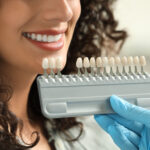The Placerville Dental Group has presented many articles on the subject of oral piercings and the likely side effects that we see from such jewelry in our dental practice. Oral piercing may continue to be popular with some of our clients, but chipped teeth and gum damage are not popular or fashionable. Our dentists promote oral health and awareness so that our patients can spend more time enjoying life and less time in the dental chair. Therefore, it may be of interest to our readers considering such piercings, or who already have piercings, to note research reported on by the Colgate website. Apparently, the material used in oral piercings can affect the amount of bacteria that collects on the jewelry.
Austrian Study Highlights Material Differences
A study conducted by Austrian researchers examined how tongue piercing affected oral health. The research focused on studs, piercings that have a small ball at one end of a bar that’s forced through the tongue. All participants in this study were given an exam and their oral health was assessed so that all met the same basic criteria. Then, each person was randomly assigned a sterile stud. These studs were made from four different materials — titanium, stainless steel and two kinds of plastic. After two weeks, participants were reexamined to see if or how these different materials influenced oral health.
Interestingly, the stainless steel and titanium studs had a higher bacterial count than the others. Bacteria appeared to attach to and reproduce on metal surfaces, more so than on plastic. Researchers concluded that these extra bacteria not only increased the risk of infections, such as from staph, but also other dental complications. It is therefore noteworthy that plastic studs may reduce the likelihood of bacterial infection, although they are presumably less durable and more likely to experience failure and subsequent separation, creating a choking risk.
In the end, the American Dental Association and the Placerville Dental Group still do not recommend oral piercings. They may adversely affect speech, eating and swallowing. Oral complications are not limited to infection alone, as a piercing may also cause uncontrolled bleeding, metal allergies, hypersensitivity, excessive drooling, nerve damage, chipped teeth, gum recession and tooth enamel loss. For further information about oral piercings, please contact the Placerville Dental Group via the phone or online and consider the other articles on our website.



Do you know if it is better to have plastic than metal in the oral cavity since plastic wouldn’t be as abrasive?
“Better” would be a relative term here. As we have often stated, oral piercings increase the likelihood of many different dental problems, especial gum recession wherever they strike regularly.
Certainly, plastic would be softer than metal, and as this article points out, less likely to harbor microorganisms, but does plastic increase the probability of breakage? While some patients are allergic to various metals, would the plastic release chemicals into the body, such as bisphenol-A?
In effect, the use of plastic piercings is simply trading one set of potential problems for another. The one getting pierced has to decide which set is less frightening to them.